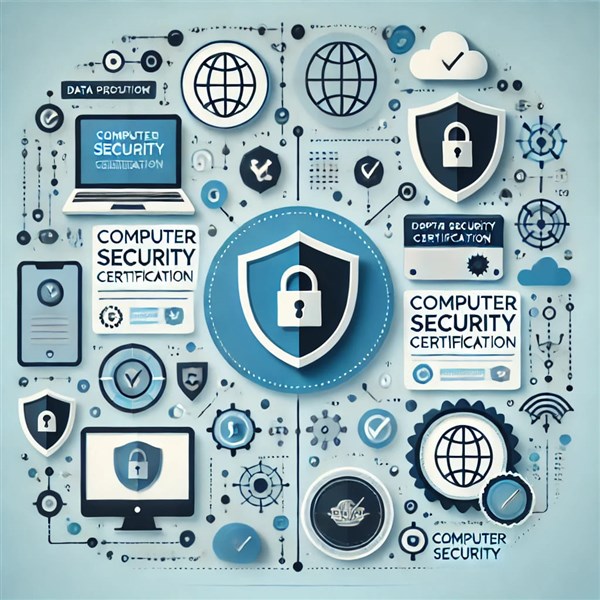
In today’s digital age, where cyber threats are constantly evolving, organizations are looking for professionals who can secure their systems, data, and networks. Obtaining a computer security certification can be a crucial stepping stone in launching or advancing a career in cybersecurity. For beginners, the road to certification may seem daunting, but with the right approach and preparation, you can successfully embark on your journey to becoming a certified computer security professional.
In this guide, we'll break down the basics of starting your journey with a computer security certification, including popular certifications for beginners, tips for preparation, and strategies for exam success.
Why Pursue a Computer Security Certification?
Before diving into specific tips, it's important to understand why earning a computer security certification is a smart move for your career.
1. Industry Demand
The demand for cybersecurity professionals has grown exponentially in recent years. According to the U.S. Bureau of Labor Statistics, employment in cybersecurity roles is expected to grow by 35% from 2021 to 2031, which is much faster than average for all occupations. Certifications demonstrate your skills and knowledge to potential employers, making you stand out in a competitive job market.
2. Skill Validation
A computer security certification verifies that you have the skills and knowledge required to perform essential tasks in the field of cybersecurity. It validates your expertise in areas such as network security, threat mitigation, risk management, and data protection.
3. Career Advancement
Whether you are just starting or looking to advance in your career, certifications can be the key to unlocking new opportunities. Many companies, especially in industries like finance, healthcare, and government, prioritize hiring certified professionals for cybersecurity roles.
4. Increased Earning Potential
Certified professionals often command higher salaries than their non-certified counterparts. Certifications are a clear indicator of your commitment to professional development, which can lead to better compensation packages.
Popular Entry-Level Computer Security Certifications
If you are just starting out, there are several well-regarded certifications designed specifically for beginners. Here are a few of the most recognized ones:
1. CompTIA Security+
CompTIA Security+ is one of the most popular and widely recognized entry-level cybersecurity certifications. It covers a broad range of security topics, including network security, threat management, cryptography, and identity management. Security+ is often considered the best starting point for individuals new to the field, as it doesn't require prior cybersecurity experience.
2. Certified Ethical Hacker (CEH)
The CEH certification, offered by the EC-Council, is designed for individuals who want to become ethical hackers. This certification focuses on how to think like a hacker and teaches you how to assess and strengthen system security from an attacker’s perspective. CEH is ideal for those interested in penetration testing, vulnerability analysis, and ethical hacking.
3. Cisco Certified CyberOps Associate
Cisco’s CyberOps Associate certification focuses on the fundamentals of security operations. It covers topics like security monitoring, incident response, and network intrusion analysis. This certification is perfect for individuals aiming for a career in security operations centers (SOC) or network security analysis.
4. Certified Information Systems Security Professional (CISSP)
Although CISSP is more advanced and usually recommended for professionals with some experience, beginners can consider it if they’re willing to commit to long-term preparation. CISSP covers eight domains of cybersecurity, including asset security, risk management, and security operations, and is highly respected in the field.
How to Prepare for a Computer Security Certification
Now that you've identified a certification to pursue, the next step is preparation. Here are some actionable steps to help you get ready for the certification exam.
1. Understand the Exam Objectives
Start by thoroughly reviewing the exam objectives for the certification you want to pursue. Most certification providers, like CompTIA or Cisco, offer a detailed exam blueprint that outlines the topics covered in the exam. Familiarizing yourself with these objectives ensures that you are studying the right material and helps you identify areas where you may need additional focus.
2. Choose the Right Study Materials
Invest in high-quality study materials that are specific to your certification exam. This can include official study guides, textbooks, online courses, video tutorials, and practice exams. Many certification providers also offer training programs and self-study resources. For instance, CompTIA offers its own Security+ certification study materials, and Cisco provides learning materials for its CyberOps certification.
Look for resources that match your learning style—whether that’s reading, watching videos, or engaging in hands-on labs.
3. Enroll in Training Courses
For beginners, enrolling in a structured training course can be incredibly helpful. Many online platforms offer courses tailored to specific certifications. Some popular platforms include:
- Udemy: Offers affordable courses on a range of cybersecurity topics and certifications.
- Pluralsight: Provides a comprehensive library of IT and cybersecurity courses, including certification prep.
- Cybrary: Focuses on cybersecurity training and offers free and premium courses for various certifications.
Instructor-led training courses are also available through institutions like CompTIA and Cisco Learning Network, which can provide a more immersive learning experience.
4. Join a Study Group or Forum
Joining a study group or online forum can help you stay motivated and learn from others. Platforms like Reddit, TechExams, and Discord communities have active cybersecurity groups where you can ask questions, share resources, and participate in discussions related to certification exams. Studying with others can also give you new insights and techniques that you might not have considered.
5. Practice with Hands-On Labs
Hands-on experience is essential in the cybersecurity field. Many certifications, such as CEH and Security+, include practical components or simulations in their exams. To prepare, consider using lab environments where you can practice real-world scenarios.
Some platforms that offer hands-on labs for beginners include:
- TryHackMe: A popular site for practicing cybersecurity skills, with challenges designed for all skill levels.
- Hack The Box: Offers a range of penetration testing and network security challenges to help you sharpen your practical skills.
- VirtualBox or VMware: You can set up your own virtual environment to practice security tasks, such as configuring firewalls or scanning for vulnerabilities.
6. Take Practice Exams
Practice exams are one of the best ways to assess your readiness for the real exam. They simulate the format, time constraints, and difficulty of the actual test, helping you get comfortable with the exam environment. Completing practice exams will also highlight areas where you need further review.
7. Create a Study Schedule
Creating a study schedule is essential to staying organized and on track. Allocate time each day or week for studying and stick to your plan. Break down topics into manageable sections and set milestones to track your progress.
8. Stay Consistent and Focused
Staying consistent in your study efforts is key. Cybersecurity is a vast field, and it can be easy to get overwhelmed by the sheer amount of information. Focus on one topic at a time, follow your study plan, and avoid cramming right before the exam. Regular, focused study sessions will be much more effective in the long run.
Taking the Certification Exam
Once you've completed your preparation and feel confident in your knowledge, it’s time to schedule and take the exam. Here are some final tips:
- Arrive early: Whether taking the exam in person or online, make sure you’re ready well before the start time to avoid unnecessary stress.
- Stay calm: Exams can be nerve-wracking, but staying calm and focused will help you think clearly.
- Use the time wisely: Don’t rush through the exam. Use the allotted time to carefully read each question and review your answers if needed.
Conclusion
Obtaining a computer security certification is a valuable investment in your future, offering new career opportunities, skill validation, and increased earning potential. By following a structured approach, using quality study materials, and gaining hands-on experience, you can successfully earn your first computer security certification from Koenig Solutions and set yourself on the path to becoming a cybersecurity expert. Whether you're starting with CompTIA Security+, CEH, or another certification, the key to success lies in preparation, practice, and persistence.







COMMENT